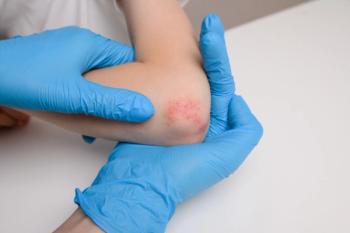
Addressing Patients Adherence with Topical Therapies
Education, honesty, and communication skills are key when it comes to creating treatment regimens.
Topical medications are the backbone of treatment for chronic inflammatory skin disease. For all kinds of skin conditions dermatologists must rely on an extensive array of creams, ointments, lotions, suspensions, foams, and solutions—often in combination—to provide both acute relief and chronic control to their patients. Many factors go into determining the prescription of choice and the outcome of topical therapy.1
Health care professionals (HCPs) need to consider diagnosis, severity, and overall goals of treatment when selecting a regimen for their patient. Outcomes can vary widely based on patient understanding of several factors such as:
- diagnosis and plan,
- perception of efficacy and safety, and
- treatment feasibility and tolerability.
Thus, while the approach to topical therapy may seem like a straightforward process, the treatment journey can be complex and variable.
Despite the efforts of many dermatologists, suboptimal topical treatment outcomes are still too common. While the blame is usually placed on inefficacious medications, ill-advised treatment plans, and refractory skin phenotypes, adherence is a key part of the treatment journey that is overlooked. Previously referred to as “compliance,” adherence refers to the degree of which patients use medications as prescribed by HCPs.
Many times it can be assumed that adherence is 100% in every clinical encounter, when in fact, its estimated to be no more than 50% in individuals with chronic disease.2 Non-adherence results in inefficient care, worse prognosis, greater hospitalizations, and increased direct and indirect costs.3 When assessing treatment response, adherence is a key, unaccounted confounder.
Topical medications present a particularly unique burden for dermatology patients. Topicals can be cumbersome, difficult to use, poorly tolerated, messy, and time consuming. In a seminal study of topical treatment adherence among psoriasis clinical trial patients, overall adherence decreased to nearly 50% by end of an 8-week treatment period, with small upticks in medication use observed around trial visit dates.4
Psoriasis is a skin condition that can be used to better understand adherence to topical therapy as it is a chronic condition requiring chronic therapy. Most patients with psoriasis have mild-moderate disease where topical therapy is a typically the best option. There are plenty of topical treatment options which are often used in a stepwise and additive fashion.
Studies have shown topical medication adherence is associated with better treatment outcomes.5 However, non-adherent and adherent patients alike strongly believe that topical psoriasis treatments are time consuming, not effective, interfere in daily activities, and are associated with side effects.6 These issues can be especially pronounced with ointment-based treatments, which are often in the earliest stages of clinical training to offer the best results despite a lack of high-quality evidence for superiority over other formulations.6 Unsurprisingly, intentional non-adherence to treatment has been estimated to be as low as 40%.6-8
In the case of psoriasis and other chronic skin diseases, clinical failure may have much more to do with a variety of other treatment-intrinsic and -extrinsic factors affecting adherence rather than active drug molecule itself.
What can be done to address topical adherence?
- Look beyond “treatment failure.” Seriously think about each step of the treatment journey as it relates to adherence.
- Learn about real (not perceived) differences in topical therapies. These differences can be more than mechanism-of-action and can include vehicle, so physicians should study the data.
- Find the right topical regimen for the patient, as it can affect the patient-provider relationship. That balance includes efficacy, safety, tolerability, feasibility, and access.
- Limit prescription complexity (numbers, types, etc.) Polypharmacy can create more problems than it solves.
- Think about the little things: simplify the message; empower with education; be flexible with treatment plans; clarify instructions as many times as needed; and just listen.
- Encourage patients to ask questions and be honest about preferences that may have led to adherence issues in the past.
Disclosures
Chovatiya has been an advisor, consultant, and/or speaker for AbbVie, Incyte, Regeneron Pharmaceuticals, and Sanofi Genzyme.
This article originally appeared on Dermatology Times.
References
- Chovatiya R. Seminar-in-Depth: Factors Affecting Patients Adherence in Topical Therapies. Presented at: PA&NP 2022 Fall Clinical Dermatology Conference. Scottsdale, AZ.
- Haynes RB, McDonald H, Garg AX, Montague P. Interventions for helping patients to follow prescriptions for medications. Cochrane Database Syst Rev. 2002;(2):CD000011. doi:10.1002/14651858.CD000011
- McDonald HP, Garg AX, Haynes RB. Interventions to enhance patient adherence to medication prescriptions: scientific review. JAMA. 2002;288(22):2868-2879. doi:10.1001/jama.288.22.2868
- Carroll CL, Feldman SR, Camacho FT, Manuel JC, Balkrishnan R. Adherence to topical therapy decreases during the course of an 8-week psoriasis clinical trial: commonly used methods of measuring adherence to topical therapy overestimate actual use. J Am Acad Dermatol. 2004;51(2):212-216. doi:10.1016/j.jaad.2004.01.052
- Carroll CL, Feldman SR, Camacho FT, Balkrishnan R. Better medication adherence results in greater improvement in severity of psoriasis. Br J Dermatol. 2004;151(4):895-897. doi:10.1111/j.1365-2133.2004.06174.x
- Castela E, Archier E, Devaux S, et al. Topical corticosteroids in plaque psoriasis: a systematic review of efficacy and treatment modalities: Topical corticosteroids in plaque psoriasis. Journal of the European Academy of Dermatology and Venereology. 2012;26:36-46. doi:10.1111/j.1468-3083.2012.04522.x
- Brown KL, Krejci-Manwaring J, Tusa MG, et al. Poor compliance with topical corticosteroids for atopic dermatitis despite severe disease. Dermatology Online Journal. 2008;14(9). doi:10.5070/D30z4408x7
- Richards HL, Fortune DG, O’Sullivan TM, Main CJ, Griffiths CE. Patients with psoriasis and their compliance with medication. J Am Acad Dermatol. 1999;41(4):581-583.
Newsletter
Pharmacy practice is always changing. Stay ahead of the curve with the Drug Topics newsletter and get the latest drug information, industry trends, and patient care tips.

























